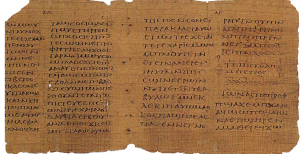Throughout 30 years of ministry, I have seen little change in the gap between the beliefs of seminary-educated clergy and our parishioners. While a very small minority of people make it through a Masters degree program at an accredited mainline seminary still clinging to the fundamentalist approach of numbers 1-4 below, and fewer than half number 5, I continue to hear many parishioners in mainline churches assume that all 5 are orthodoxy.
- Moses wrote the first five books of the Bible.

Leningrad Codex, thought to be the oldest existing Hebrew text of the Bible. - Paul wrote all the books with his name on them.
- Revelation was written to predict the future.
- The Gospels quote Jesus accurately.
- The Bible condemns homosexuality.
- Clergy who paid attention during their Old Testament class know that the expression the “Book of Moses” refers to 5 books written about Moses, not by Moses. They arose over generations of oral composers who were edited during and shortly after the Babylonian exile, many centuries after Moses died.
- A man named Paul, previously named Saul, wrote letters to churches in Rome, Corinth, Philippi, Thessalonica, and Galatia. A generation later, His followers wrote letters under his name (and their readers understood perfectly that they wrote under his name for a specific purpose) to compose Ephesians and the pastoral letters, such as 1 and 2 Timothy and Titus.
- Revelation, the English word rendered from the Greek word apocalypse, means “unveiling,” as in a curtain pulled back to reveal the backstage workings. The genre of apocalypse held a place of popularity in the first century not because readers expected a piece of apocalyptic literature to predict the future, but because it laid out a vision of hope for oppressed and persecuted people. Beyond the theological affirmation that the end of the world, whenever it happens, will remain in God’s hands, the Revelation of John does not concern itself with when or how the world will end. John of Patmos sat down to write Revelation in order to give encouragement to persecuted people who wondered if God still ruled the world in the midst of their suffering and injustice. John used the well-known literary genre of apocalypse to make his theological affirmation that God stood with those who suffered for a just cause.
- Jesus spoke Aramaic.
 The Gospels are written in Greek. In addition to translation issues, the reason the four Gospels often quote Jesus differently is that the memories and the agendas of the Gospel writers differ from each other. We can look at the differences as reflections of the different cultures and spiritual needs of the communities that produced each Gospel.
The Gospels are written in Greek. In addition to translation issues, the reason the four Gospels often quote Jesus differently is that the memories and the agendas of the Gospel writers differ from each other. We can look at the differences as reflections of the different cultures and spiritual needs of the communities that produced each Gospel.
- Secular media present the world as a place in which some people believe in the authority of Scripture and therefore condemn homosexuality and others do not affirm the authority of Scripture and therefore acquiesce to the cultural trend of accepting full inclusion of LGBT people. The majority of Presbyterian clergy, (and large portions of other mainline clergy) both affirm the authority of Scripture and believe that the Bible does not condemn homosexuality; in fact, it affirms the inclusion of any who are outcast because of sexual differences from the majority in the culture. The “sin of Sodom” in the Bible does not refer to same-sex intimate relationships. Every time the Bible spells out the sin of Sodom, it describes the sin of the powerful taking advantage of the weak, the rich taking advantage of the poor.
One way to interpret the divide between clergy and parishioners of mainline churches is that a seminary education corrupts. Or, perhaps, seminaries inoculate clergy from fundamentalism but we clergy have been less than articulate in conveying our biblical education to our parishioners.
Have you experienced the divide between what clergy believe about the Bible and what parishioners believe? How do you account for it?
To receive your free copy of Cheaper Than A Seminary Education, a 45-page booklet on reading the Bible in context, and subscribe to my weekly (almost) newsletter, click here.
Interesting! One reason we ended up leaving the Presbyterian church was because our pastor would talk with us about his own ideas on issues, but would preach very differently because he knew what most of the congregation wanted, which tended to be a more traditional conservatism. That disconnect got to be too jarring. We became Unitarian Universalists at that point, where we’ve been very happy.
Thanks for your comment, Joan. Your experience speaks, I think, to the importance of self-differentiation in leaders, including pastors. Preaching as demand feeding may keep the old guard happy for a while, but it doesn’t give the congregation a chance to hear and respond to anything prophetic. I have UU friends, but have never been part of that community. Would you say that UU pastors have more leeway to take stands that many in the congregation oppose, or that UU congregations, like other traditions, tend to choose pastors who agree with them?